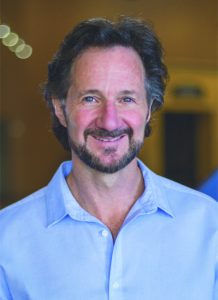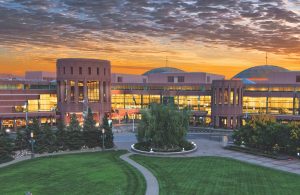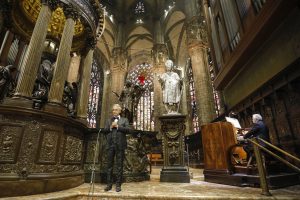
by Steve | Jul 8, 2020 | July-August 2020, Magazine, Magazine Articles
 By Max Wilkins –
By Max Wilkins –
The worldwide protests in response to the death of George Floyd in Minneapolis took place during the week that God’s people celebrate Pentecost – the birthday of the Church, the birthday of the mission of Jesus, and the Lord’s sending of Holy Spirit, the Breath of Life.
In massive events all around the globe, activists of all races, creeds, and religions recalled his plea, “I can’t breathe!”
There is a Pentecost message in all of this, and it provides some grounding and some hope.
That first Pentecost took place when the disciples had gathered at Jesus’ direction in a prayer meeting in Jerusalem (see Acts 1:6-11). Also gathered there, just outside the room where they were meeting, were people from every race, every tribe, every language in the known world. “Now there were staying in Jerusalem God-fearing Jews from every nation under heaven. When they heard this sound, a crowd came together in bewilderment, because each one heard their own language being spoken” (Acts 2:5-6).
Immediately upon receiving the promised Holy Spirit, the disciples went out into that gathering and shared this Breath of Life with the people. That very day a Spirit led community formed that included more than 3,000 people – African people, Asian people, Europeans, and Semitic people.
One of the principle purposes of the sending of that Breath of Life was to inspire community and unity (not sameness or negation of culture and distinctiveness, but a unity of spirit, of purpose, of value for life before God).
Jesus was initiating his mission with the coming of the Spirit. “You will receive power,” he had told the disciples, “when the Holy Spirit comes upon you AND you will be my witnesses, in Jerusalem and Judea and Samaria and to the ends of the earth.”
Those recipients of the Breath of Life were sent to bring together communities from all parts of the world, and to recreate that first Pentecost by coming together across lines of division, expectantly anticipating the sharing of the Breath of Life. The mission is to help those who are unable to breathe – physically, spiritually, emotionally – to be able to breathe the Breath of Life. And God’s people can only join that mission by fighting, in prayerful and tangible ways, against the very systemic forces that are crushing the breath out of people.
George Floyd died in Minneapolis, suffocated in broad daylight in front of a crowd. Many people around the country have taken up the cry of “I can’t breathe” in protest of Mr. Floyd’s violent murder and in solidarity with his experience of helplessness in the face of racial injustice.
I recognize, however, that these words are not just the dying gasp of George Floyd. They are also the suffocating cry of millions of people around the world whose necks are being crushed by the systemic evils of racism, of injustice, of economic deprivation, and of indifference. Evil, in its various forms, has been crushing the life out of human beings forever. And evil as it relates to racism, to abuse of power, to white supremacy, and to indifference to the suffering of those outside our own tribe, is particularly virulent right now. It is also totally contrary to the will of God and to God’s plans for the people of God.
Make no mistake, although the issues can be politicized, these are essentially spiritual issues. Some legal justice may occur in this situation. Yet, even if there are criminal convictions in this case, it is only a bandage on a hemorrhage if the inherent injustice built into the system and rampant in our society is not addressed and acted upon in tangible ways. Systems need to change; hearts need to change. And I don’t think that can happen apart from the work of the Holy Spirit in and through his people.
I praise God that by his grace we are a part of his people. Please continue to be instruments of the Breath of Life.
Come Holy Spirit.
Max Wilkins is the president of TMS Global.

by Steve | Jul 8, 2020 | July-August 2020, Magazine, Magazine Articles
 By B.J. Funk –
By B.J. Funk –
I have such sweet memories of my mother, who has been vacationing with Jesus in heaven for 18 years. Imagine my surprise when I recently found an issue of Good News from 1984 among her valuables. Even more precious is her handwritten note on the front: “Read Maxie Dunnam’s article, page 7.”
A personal message from Mama? What beautiful irony that I am now blessed to write for a magazine my mother was reading 36 years ago. I had no idea! I love God’s surprises.
In his article, “You Can Grow in your Walk with God,” Maxie discusses how E. Stanley Jones was so instrumental in renewing his spiritual life. In addition to reading Dr. Jones’ book In Christ, Maxie also attended a Christian ashram. There, at this place of religious retreat, Maxie learned about being the actual dwelling place of Christ.
Searching for deeper meaning, Maxie vividly remembered his experience at the altar as the ashram service ended. Brother Stanley asked if the participants wanted to be whole, adding that the only possibility for wholeness was the indwelling Christ. Dunnam responded with an enthusiastic YES! I nodded my own silent YES!
He began to change his attitude about his Christian life, from that of ministering for Christ to that of allowing Christ to live through him. Jones’ In Christ put Maxie in touch with what would become the central reality of his faith journey: the indwelling Christ. Maxie’s quest for a deeper walk with God brought new life into his personal relationship with Christ. He then wanted his vocational purpose to be helping others develop a deeper walk with God. He developed the following definition of spiritual formation: “That dynamic process of receiving through faith and appropriating through commitment, discipline, and action, the living Christ into my own life to the end that my life will conform to and manifest the reality of Christ’s presence in the world.”
My mother underlined these next words: “Simply put, the task of every Christian is to learn to say yes to Christ in every area of life every day. That’s the bottom line of developing a deeper walk with God.” I was being given a rare and beautiful look into my mother’s sold-out commitment to Christ. She lived before me always the words she underlined.
Maxie, instead of focusing only on the three major ingredients for developing and keeping our faith alive – prayer, Scripture study, and corporate worship – as vital as these are, focused his article on other necessary commitments which don’t receive as much emphasis.
The first is being aware of God’s presence throughout the day. More than only the importance of a daily quiet time, we must develop practices that keep us aware of Christ’s presence. To build awareness, Maxie commits each day to Christ. He visualizes Christ’s presence in every situation he will encounter throughout the day.
Mama carried these thoughts into the Children’s Division of our United Methodist Church, where she served as Superintendent for 35 years.
The second is Christian conferencing, deliberately seeking out and listening to the stories of other Christians. Structured small groups are good for this, as is a spontaneous sharing of our faith.
A third discipline is that of solitude. Maxie wrote that his times of silence are sometimes only a few hours or maybe a 24-36-hour period of silent retreat. The purpose of silent times is not just to talk to God, but to learn how to listen.
Confession and examination of conscience bring important questions to the forefront. “Was I condemning today? Did I speak the truth in love?”
A final discipline is generosity, which includes not only tithing but generosity with our time and attention to others. Recognizing that my mother’s Christian life was enhanced by this article makes me know that I will refer to Maxie Dunnam’s article again and again, wanting to take every word into my own desire for a deeper walk with Christ.
Thank you, Maxie. And thank you, Mama.

by Steve | May 18, 2020 | Magazine, Magazine Articles, May/June 2020
 By Rob Renfroe –
By Rob Renfroe –
We are living in a time of great turbulence and anxiety. The coronavirus pandemic has stirred panic. As Christians, part of our lifelong discipleship is seeking to allow faith to overcome our fears.
“Do not worry about your life, what you will eat or drink; or about your body, what you will wear. Is not life more than food, and the body more than clothes?” asked Jesus in the Sermon on the Mount. “Look at the birds of the air; they do not sow or reap or store away in barns, and yet your heavenly Father feeds them. Are you not much more valuable than they? Can any one of you by worrying add a single hour to your life?” (Matthew 6:25-34).
The Latin word from which we derive “anxiety” means “to choke.” The Anglo-Saxon root for “worry” means “to strangle.” And that’s what worry does. It chokes the life out of us. It suffocates our spirits. It strangles our ability to make good decisions.
Jesus asks: “Who of you by worrying can add a single hour to his life?” The obvious answer is: None of us can extend our lives by worrying. Not for an hour. Not for a minute. Not for a second. In fact, research tells us just the opposite. Physically, anxiety can lead to hypertension, heart attacks, and a compromised immunological system. Emotionally, it can make you irritable and unstable.
We think we worry because of external circumstances. But that’s not true. You can put two people in identically bad situations, and one will worry and one will not. That’s because worry is determined more by our internal condition than our external condition.
If there is little faith within us, the smallest concerns will fill our hearts with great anxiety. But if we take hold of faith – and let faith take hold of us – there will be little room for fear within us. Jesus provides a prescription for letting go of worry.
First, he tells us to have faith in God’s character. “Look at the birds of the air; they do not sow or reap or store away in barns, and yet your heavenly Father feeds them. Are you not much more valuable than they?” (Matthew 6:26). If God can meet the needs of the birds who have to go out and find food every day, certainly he can provide for us who have the ability to work, and save, and plan.
Do you believe God knows you, loves you, is aware of all your needs, and will provide for you? Not everybody does. I remember praying with an elderly man many years ago who was suffering with cancer. He had lost his wife and he felt alone and he was hurting. I asked him if he knew that God loved him. I’ll never forget his answer. He said: “It feels like God doesn’t even know my name anymore.”
There will be many times in our lives when it will feel as if God does not care about us and that he’s not working for our good. And we must decide: Will I trust my feelings or will I trust my God? Will I trust that God is a good, wise, powerful, and loving heavenly Father who knows what I need?
“God is too good to be unkind and he is too wise to be mistaken,” it has been said. “When we cannot trace his hand, we can always trust his heart.”
I know it’s a frightening time for some of us. Life is uncertain and full of peril. It always has been and it always will be. What’s not uncertain is the character of God. He is our heavenly Father, he knows us, he loves us, he is powerful and wise and he will provide for us.
Second, have faith in God’s promises. “Seek first the kingdom of God and his righteousness, and all these things will be added to you,” said Jesus (Matthew 6:33, ESV).
When we face difficult times, we turn to something. We look for something to trust in and to stand on. Some of us look to our finances. As long as they’re strong, we’re confident and we feel like we can handle whatever the world throws at us. Some of us trust our wisdom and our intellect. Some of us turn to our resourcefulness. Whatever we trust in, one day we will find it insufficient.
When your wife is diagnosed with cancer, when your child is addicted to drugs, when a friend betrays you, when your heart is broken, you are going to find that you need a strength that is greater than what you possess or this world can provide. And you will need to trust in the promises of God: “I know the plans I have for you, plans for good and not for evil” and “Come unto me all you who labor and are heavy laden and I will give you rest” and “Trust in the Lord with all your heart, in all your ways acknowledge him, and he will direct your paths” and “I will never leave you nor forsake you.”
When you’re anxious and afraid, the strength you need will not come from having all the right answers, but from having faith in the promises of God that he will be with you and provide for you all that you need.
Third, have faith that with God’s help you can overcome. The apostle Paul put it this way: “I can do all things through Christ who strengthens me” (Philippians 4:13).
Loss of a loved one, a divorce, getting laid off, illness, financial set backs – nobody wants any of these things. All of them are difficult and painful and give us all kinds of reasons to be anxious and worry. But through faith in Christ, you can do what you need to do to overcome.
“Therefore do not worry about tomorrow, for tomorrow will worry about itself,” said Jesus. “Each day has enough trouble of its own” (Matthew 6:34).
You can’t be anxious about the future and live a full, joyful, Christ-centered, Spirit-filled life in the present. You can live worried about tomorrow or you can live powerfully today – but you can’t do both. “Anxiety does not empty tomorrow of its sorrows,” said Charles Spurgeon, “but only empties today of its strength.” God has promised to give you everything you need for today. Don’t give that strength away by worrying about something that may never happen tomorrow.
Instead, offer a prayer that opens yourself to God’s presence and strength. Or, help someone who’s struggling. Listen to praise music and read Scripture. Before you get out of bed in the morning, count your blessings and declare, “This is the day the Lord has made, let us rejoice and be glad in it.”
Stop looking at your portfolio every day. It’s bad – and it’s going to be that way for a while. Stop addictively watching the news. You can stop accepting the anxiety of the people around you. Just because they’re worried, you don’t have to be. There is something worse than getting sick. That’s living afraid.
But fear is not the mark of the Christian. “For God has not given us a spirit of fear and timidity, but of power, love, and self-discipline,” writes Paul (2 Timothy 1:7). Christian living is walking in power, love, and the self-discipline to do what we can do today and to leave the rest to God.
Has worry ever solved a problem? Has worry every created a solution or given birth to strength or brought God’s power to a desperate situation?
People who are free from burdensome worry are people who make decisions and act. They determine what they can do and they do it. And then they live their life holding on to faith in the character of God, in his promises, and in the belief that with God’s help they can and they will overcome.

by Steve | May 18, 2020 | Magazine, Magazine Articles, May/June 2020

The Minneapolis Convention Center — scheduled to host the 2020 General Conference — announced it is now cancelling gatherings of 50 or more people through May 10. Before the convention center’s decision, the Commission on the General Conference had scheduled a teleconference March 21 to consider postponement of The United Methodist Church’s top legislative assembly. Photo by Dan Anderson, courtesy of Meet Minneapolis and the Minneapolis Convention Center.
By Heather Hahn –
With the coronavirus disrupting lives worldwide, General Conference organizers determined they have no choice but to postpone The United Methodist Church’s top legislative assembly.
The Minneapolis Convention Center – scheduled to host the 2020 General Conference – cancelled gatherings of 50 or more people through May 10. The shutdown covers the first five days of the denomination’s 10-day meeting, which was set to draw 862 delegates, 66 bishops, and others from four continents.
“This news is not unexpected based on the current guidance from health officials and we expect to move forward with new plans as quickly as possible,” Kim Simpson said in a statement. She is the chair of the Commission on the General Conference that plans the big meeting.
The commission’s executive committee, which met by teleconference March 18, decided the venue’s announcement meant that General Conference could no longer go forward May 5-15 as planned. However, commission members do not yet know how quickly they can announce new dates.
The convention center said it made its decision based on guidance from the Minnesota Department of Health “to protect the public’s health and slow the rate of the transmission of COVID-19.”
“Each week, we will seek guidance from MDH on changes to this policy or in the end date,” the convention center added. Before the convention center’s decision, the full Commission on the General Conference had scheduled a teleconference to consider a possible delay.
The Council of Bishops executive committee requested postponement March 13 in response to the life-threatening virus and increasing travel restrictions that might prevent nearly half of the delegates from reaching the U.S. About 43 percent of General Conference delegates come from Africa, Europe or the Philippines.
Bishop Bruce R. Ough, who leads the Minnesota and Dakotas conferences, is a member of the bishops’ executive committee. “I believe the safety of the delegates and the fairness of the conference’s legislative processes are paramount,” Ough said.
“The Dakotas-Minnesota Area has worked very hard to extend extraordinary hospitality to the General Conference delegates and guests. If the Conference is postponed, there would, of course, be disappointment. However, this disappointment would not dampen the area’s openness to working with the Commission on the General Conference to reschedule the event in Minneapolis.”
As of April 20, Johns Hopkins University — which is tracking cases — reported that the coronavirus had infected 2.4 million people and killed more than 166,000 worldwide. In the U.S., more than 41,000 people have died from COVID-19.
“The health and safety of participants, as well as their families and communities, is a primary concern. This includes our concern for the Minneapolis area,” General Conference organizers said in a joint email to UM News. The leaders include Simpson, the Rev. Gary Graves, General Conference secretary, and Sara Hotchkiss, business manager.
“We also want to do all that is within our power to ensure that all delegates are fully able to participate in the many important decisions we are currently facing as a church,” they said.
Under The United Methodist Church’s constitution, General Conference is to meet every four years “at such time and in such place” as determined by General Conference itself or “by its duly authorized committees.” The General Conference commission, which is elected at General Conference, is that duly authorized committee. Only the full commission is able to set a new date or decide on an alternate plan.
The convention center’s announcement means that the church will not incur significant financial penalties for cancellation of the contract.
General Conference is not like a typical church meeting or worship service, some of which have already moved online because of the virus.
The 10-day international legislative meeting resembles a session of the U.S. Congress with elements of a United Nations general assembly.
Multiple interpreters work with hundreds of delegates throughout the gathering to translate proceedings. During the first week of General Conference, delegates meet simultaneously in different legislative committees – 14 were planned for this year. The delegates then come together to vote in plenary during the second week. All votes are by secret ballot, using secure voting devices of limited range. Many delegates come from countries where internet connections are unreliable, if available at all. The logistics of General Conference involve obtaining hundreds of visas and reserving hotel rooms, flights, and the venue needed for more than 1,000 people.
For this year’s gathering, the General Conference commission also was adding stricter requirements for credentialing after an investigation found four ineligible people cast votes during the 2019 General Conference using credentials of absent delegates.
General Conference organizers and the bishops acknowledge the legislative assembly scheduled this year comes at a particularly sensitive time for the church. United Methodists have submitted multiple proposals to resolve the denomination’s longtime debate over homosexuality by splitting the denomination.
General Conference also faces other critical decisions such as setting the denomination’s four-year budget and electing numerous leaders including the members of the Judicial Council, the denomination’s top court.
“We will be moving forward responsibly and that includes a number of complex matters that must be planned for,” General Conference organizers told UM News.
Heather Hahn is a multimedia news reporter for United Methodist News.

by Steve | May 18, 2020 | Magazine, Magazine Articles, May/June 2020

Andrea Bocelli and organist Emanuele Vianelli in the Milan Cathedral. Photo: Luca Rossetti (Decca Records).
By Steve Beard –
Perhaps no singular image better captured Easter under the treacherous cruelty of the coronavirus than Andrea Bocelli performing a solitary sacred concert in the spectacularly cavernous Duomo di Milano, the cathedral in Milan, Italy.
By the time the sun had risen on Easter morning, more than 108,000 deaths had occurred around the globe because of COVID-19. According to Johns Hopkins University, there were more than 1.7 million cases worldwide and the virus was detected in 177 countries. At that time, more than 400,000 people had recovered internationally. By the time you read this, all those statistics will be woefully outdated.
“Zoomed” out and stir crazy, legions of sequestered souls were craving relief – something of substance, a dash of beauty, a sliver of hope. There would be no ostentatious Easter bonnets at church this year. There would be no large family feasts – including Aunt Judy’s deviled eggs on the most sacred day of the year. There would be no neighborhood Easter egg hunts for the children. For many, the Sunday morning service included singing “Up from the Grave He Arose” in pajamas and house slippers while live-streaming and praying for the speedy and joyous return of congregational worship – even surrounded by those bellowing off-key.
Bocelli had been invited by the city of Milan and the cathedral to lift the spirits of grief-stricken Italians. As a certifiable star of opera, classical, and pop music, the tenor has sold over 90 million records worldwide.
“On the day in which we celebrate the trust in a life that triumphs, I’m honored and happy to answer ‘Si’ to the invitation of the City and the Duomo of Milan,” Bocelli said in the video’s introduction. “I believe in the strength of praying together. I believe in the Christian Easter, a universal symbol of rebirth that everyone – whether they are believers are not – truly needs right now. … It will be a joy to witness it, in the Duomo, during the Easter celebration which invokes the mystery of birth and rebirth.”
The setting was awe-inspiring. Milan’s Cathedral is an architectural gemstone. It has been under construction on-and-off since 1386. It is nearly the largest sanctuary in Italy, second only to St. Peter’s Basilica in Rome. “What a wonder it is,” observed Mark Twain about the cathedral in his book Innocents Abroad. “So grand, so solemn, so vast!” There are 135 marble spires and thousands of statues of prophets and patriarchs, martyrs and saints.
The size and scope are hard to comprehend. More than 40,000 people can fit comfortably within the cathedral. Sadly, more than half that number of Italians have died from COVID-19.
On Easter, the cathedral was empty – with the exception of Bocelli, organist Emanuele Vianelli, and a skeleton film crew. The tenor and musician were the only two that did not wear masks.
The international opera sensation sang several stirring numbers in Italian from inside the cathedral. Bocelli then slowly walked through the gargantuan columns down the center aisle to sing “Amazing Grace” in English overlooking the barren plaza outside as his finale. The first verse was unaccompanied by the organ. It was as if he was rolling away a stone and taking the empty-grave message of Easter outside the confines of altar and sanctuary to a hope-starved world.
The response was astounding. Nearly 3 million people around the globe witnessed the half-hour concert on YouTube as it was being performed. Within 24 hours, the performance had 32 million views. For so many – approaching Easter from vastly different spiritual perspectives – this was the message:
Amazing grace! How sweet the sound
That saved a wretch like me!
I once was lost, but now am found;
Was blind, but now I see.
The words of the song have unique resonance with Bocelli. As many know, he was diagnosed with congenital glaucoma at 5 months old, and became completely blind at age 12, following a sporting accident.
“I am moved and delighted to have received such an overwhelming reaction that has gone beyond our highest expectations,” Bocelli said the following day. “For an artist, yesterday’s event is the reason for the sacrifices of a lifetime; for a believer and a Catholic as I am, it was further confirmation of the benevolent smile with which the Heavenly Father looks to his children. It was an immeasurable honor and privilege to lend my voice to the prayers of millions of people, gathered in a single embrace – a small, great miracle of which the whole world was the protagonist and which confirms my optimism about the future of our planet.”
’Twas grace that taught my heart to fear,
And grace my fears relieved;
How precious did that grace appear
The hour I first believed!

Photo: Luca Rossetti (Decca Records).
The weeks prior to Easter had been overwhelming for Italians. Funerals had to be cancelled. Social distancing had been rigidly enforced. There had been video footage of a convoy of military trucks transporting bodies away from an overwhelmed crematorium in the northern city of Bergamo, 30 miles east of Milan. The national newspaper Corriere della Sera reported that the operation had taken place with 18 army trucks transporting around 60 coffins away from Bergamo to be taken to neighboring cities. “The crematorium in Bergamo, working flat out on a 24-hour basis, can cremate 25 deceased persons. It’s clear that it could not handle the numbers seen in the past few days,” said the statement from the Bergamo municipal government.
Yea, when this flesh and heart shall fail,
And mortal life shall cease,
I shall possess, within the veil,
A life of joy and peace.
The YouTube audience responded to the concert with comments filled with gratitude. “Andrea Bocelli’s songs speak to the soul, especially in these devastating times. May God heal our land and strengthen every living soul on Earth. Lord, your children are crying out for your love,” said one fan named Sydney.
“Extraordinary voice,” said another fan named Hayley. “Such beauty. We all need this during these difficult days. We must support one another, love, be grateful. Life is so delicate, precious.”
The great novelist Fyodor Dostoevsky once wrote, “Beauty will save the world.” Since he penned that premise, those words have been hotly contested. Perhaps from the response to Bocelli’s affirmation of faith through his songs, we can see the outline of what Dostoevsky may have meant.
Steve Beard is the editor of Good News.

by Steve | May 18, 2020 | Magazine, Magazine Articles, May/June 2020

Artwork by Scott Erickson (scottericksonart.com).
By Omar Al-Rikabi-
“A terrible screaming began among the English,” John Wesley wrote in his journal, “But the Germans calmly sang on.”
Sailing aboard The Simmons from England to the American Colonies in 1736, Wesley found his ship overtaken by storm after storm. Ironically, the ship sailed in October in an attempt to dodge hurricane season, but now here they were, with the wind and sea tearing the main sail in two and water flooding the boat.
Wesley, a minister starting what would be a failed missionary trip to Georgia, was scared of drowning and found himself in a crisis of faith, “ashamed of my unwillingness to die.” But also on board were 26 Moravian missionaries from Herrnhut, Germany, and as he worried, they worshiped.
It’s fitting that the founder of our movement hoped to avoid hurricanes, because today the United Methodists are facing their own category 5 storm: Being in ministry during a worldwide pandemic and awaiting a postponed General Conference that will determine the future of our denomination.
The thing about hurricanes is that we can see them forming out at sea a long way off, days away. The anxiety builds when the weather reports put all the different “spaghetti model” forecasts on the TV screen showing all possible trajectories, turns, landfall locations, wind speeds, and flooding.
But no one really knows where a hurricane will hit and how bad the damage will be until it actually gets here. And if you’ve ever been through a hurricane, it doesn’t matter how much you prepare or even if you’ve been through one before, when they hit they’re still a shock and they do some kind of damage. The issue is how much, and what it will take to recover.
The anxiety is building. There is shock and there will be damage. But nobody knows what will actually happen until we experience the full ramifications. So what are churches to do while we wait, and who are we going to be in these storms? What’s our plan?
Our plan should be breakfast. Stick with me on this.
In Acts 27, the Apostle Paul sets sail for Rome, and along the way “the weather changed abruptly, and a wind of typhoon strength (called a ‘northeaster’) burst across the island and blew us out to sea” (Acts 27:14, NLT). The crew panics and starts heaving cargo overboard to lighten the load. They lower the lifeboats, but Paul convinces them they’ll all drown if they jump ship, so they cut the boats loose. They can’t see the sun or the stars, so they can’t navigate. And in dramatic fashion, the Scripture says, “at last all hope was lost.”
All fear and no hope. Sound familiar?
Finally, after two weeks of fearfully trying to outlast the weather, Paul’s had enough and offers them … breakfast: “Just before dawn Paul urged them all to eat. ‘For the last fourteen days,’ he said, ‘you have been in constant suspense and have gone without food – you haven’t eaten anything. Now I urge you to take some food. You need it to survive. Not one of you will lose a single hair from his head.’ After he said this, he took some bread and gave thanks to God in front of them all. Then he broke it and began to eat. They were all encouraged and ate some food themselves. Altogether there were 276 of us on board” (Acts 27:33-37).
It wasn’t that the sailors couldn’t eat because the storm left them with no food. They had plenty of food but were too afraid to eat because of the storm. And what did Paul serve first? The Eucharist. Holy Communion. The body of Jesus Christ: “[he] took some bread, gave thanks to God before them all, and broke off a piece and ate it. Then everyone was encouraged and began to eat.” That’s the Lord’s Breakfast. The crew had so many seconds and thirds that they were throwing food overboard!
As our hurricane approaches, how do we do the same? How can pastors and congregations learn from and lead like the Apostle Paul?
One possibility is by looking at the “Waffle House Index.” What is that? It is an informal metric the Federal Emergency Management Agency (FEMA) has used to determine how bad a storm is and how long recovery will take. Why? Because the corporate leadership at Waffle House have a whole system for keeping restaurants open in a storm. They know how to do natural disasters.
The index is three colors based on what they can offer: green means Waffle House is still serving the full menu; yellow means they’re serving a partial menu because there is no power or water; red means no menu and the restaurant is closed, so you know the damage is bad – really bad.

Photo by Chad Brooks.
We need to be a “Waffle House church,” first offering people the body and blood of Jesus Christ, then offering a full menu of the faith even in the midst the storm. How?
First, we need to know our menu: the full story of Scripture and the robust depth of our theology, not just our favorite orders (the items we like to pick and choose). How do we learn (or re-learn) it? Maybe we need a congregation-wide confirmation class, a deep dive into the Apostle’s Creed, maybe a renewed form of small groups that Wesley called class meetings and banded discipleship. Whatever a Holy Spirit imagination gives us for preaching and teaching, we can’t know our menu just for the sake of more information, but for the sake of transformation into being like Christ.
Second, we need to become better customers. Yes, there’s a lot of talk about how Christians shouldn’t be consumers, but that’s not what I’m talking about here. If you’ve ever waited tables, you know customers are most known for one thing: complaining. Maybe it’s because “the customer is always right” even when they’re wrong. I get it, because if you feel left out of the preparation process (not in the kitchen, so to speak), or your expectations haven’t been met (“This isn’t what I ordered!”) it’s easy to become disenfranchised. But we’ve got to move away from all the grumbling, criticizing, and fear-mongering. In other words, we’ve got to stop screaming.
Third, we need to move from being customers to being waiters. Theologically speaking we’re supposed to be “servants,” because Jesus says things like, “For even the Son of Man came not to be served but to serve others and to give his life” (Mark 10:45, NLT). And of course, one of our mandates is to have the same attitude of Jesus Christ who took the position of a servant (Philippians 2:5-7).
Consider a story from last November of a Waffle House in Birmingham, Alabama. Because of a glitch in scheduling, just one cook was on duty after midnight to manage about 30 hungry and inebriated customers. He couldn’t keep up, but then one customer got up, put on an apron, and started washing dishes. Another started cleaning tables and serving coffee. With the two customers-turned-waiters at work, the lone employee could keep cooking.
To be this kind of servant in the storm evokes what Wesley wrote about later in his journal at sea: “There is something special about these Germans. They are always so happy! And, they do the menial jobs on this ship without protesting.”
Remember, we’re not a bunch of inebriated customers at one in the morning, we’re servant people filled with the Holy Spirit (Acts 2). This means our storm might give us the opportunity to creatively step up and serve the souls of some hungry and angry people (aka “hangry”). But like Paul, we’re serving them Jesus in the middle of the storm because Jesus is the one who created the very wind and waves (Colossians 1:16) and then later spoke to the storm and told it to calm down (Mark 4:35-41).
And isn’t it interesting that when he was in the storm at sea Wesley asked himself, “How is it that thou has no faith?” which is the same thing Jesus asked his disciples in their boat? Jesus is asking us the same question now.
John Wesley said, “You have one business on earth – to save souls.” What does that business look like in our churches in this season of storms? It looks something like the way late chef Anthony Bourdain described a Waffle House: “Where everybody, regardless of race, creed, color or degree of inebriation, is welcomed. Its warm, yellow glow – a beacon of hope and salvation – inviting the hungry, the lost, the seriously hammered all across the south to come inside. A place of safety and nourishment. It never closes. It is always faithful, always there for you.”
And what happens when the storm moves from a metaphorical hurricane to a literal pandemic? The Waffle House had to move to essential staff cooking up a limited menu for take-out. The restaurant building may be closed, but you can still get waffles to eat at home. While not ideal, it sure beats no waffles at all.
The church is still open, but only for essential staff to prepare limited worship services online and Bible studies for streaming-out. The church building may be closed, but we can still receive Jesus in our homes. The basics of the menu have not changed, and the opportunity of how to be better servers has shifted.
Eventually, Jesus will return and there will be no more storms (literal or metaphorical). And when he does we know that, “The servants who are ready and waiting for his return will be rewarded. I tell you the truth, [Jesus] will seat them, put on an apron, and serve them as they sit and eat!” (Luke 12:37, NLT). Until then, we might as well set the table.
Omar Al-Rikabi is the senior pastor of Heath United Methodist Church in Heath, Texas, and the author of The Advent Mission (Seedbed). This article first appeared on WesleyanAccent.com. You can follow him on Twitter @omarrikabi.

 By Max Wilkins –
By Max Wilkins –
 By B.J. Funk –
By B.J. Funk –




